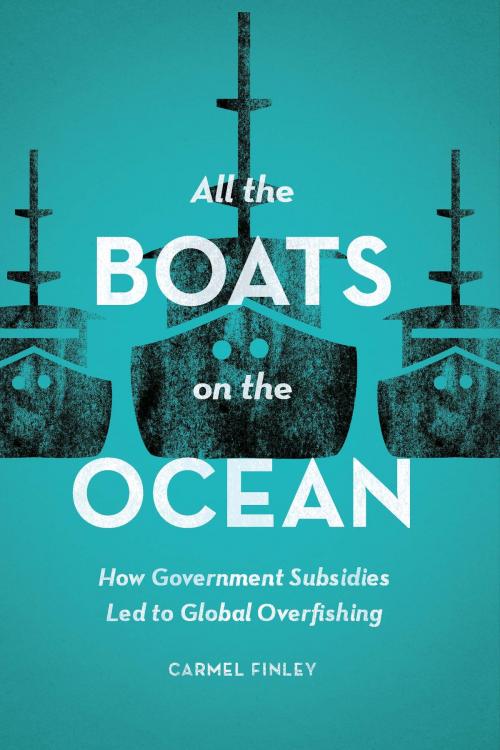All the Boats on the Ocean
How Government Subsidies Led to Global Overfishing
Nonfiction, Science & Nature, Science, Biological Sciences, Marine Biology, Nature, Environment, Environmental Conservation & Protection| Author: | Carmel Finley | ISBN: | 9780226443409 |
| Publisher: | University of Chicago Press | Publication: | February 15, 2017 |
| Imprint: | University of Chicago Press | Language: | English |
| Author: | Carmel Finley |
| ISBN: | 9780226443409 |
| Publisher: | University of Chicago Press |
| Publication: | February 15, 2017 |
| Imprint: | University of Chicago Press |
| Language: | English |
Most current fishing practices are neither economically nor biologically sustainable. Every year, the world spends $80 billion buying fish that cost $105 billion to catch, even as heavy fishing places growing pressure on stocks that are already struggling with warmer, more acidic oceans. How have we developed an industry that is so wasteful, and why has it been so difficult to alter the trajectory toward species extinction?
In this transnational, interdisciplinary history, Carmel Finley answers these questions and more as she explores how government subsidies propelled the expansion of fishing from a coastal, in-shore activity into a global industry. While nation states struggling for ocean supremacy have long used fishing as an imperial strategy, the Cold War brought a new emphasis: fishing became a means for nations to make distinct territorial claims. A network of trade policies and tariffs allowed cod from Iceland and tuna canned in Japan into the American market, destabilizing fisheries in New England and Southern California. With the subsequent establishment of tuna canneries in American Samoa and Puerto Rico, Japanese and American tuna boats moved from the Pacific into the Atlantic and Indian Oceans after bluefin. At the same time, government subsidies in nations such as Spain and the Soviet Union fueled fishery expansion on an industrial scale, with the Soviet fleet utterly depleting the stock of rosefish (or Pacific ocean perch) and other groundfish from British Columbia to California. This massive global explosion in fishing power led nations to expand their territorial limits in the 1970s, forever changing the seas.
Looking across politics, economics, and biology, All the Boats on the Ocean casts a wide net to reveal how the subsidy-driven expansion of fisheries in the Pacific during the Cold War led to the growth of fisheries science and the creation of international fisheries management. Nevertheless, the seas are far from calm: in a world where this technologically advanced industry has enabled nations to colonize the oceans, fish literally have no place left to hide, and the future of the seas and their fish stocks is uncertain.
Most current fishing practices are neither economically nor biologically sustainable. Every year, the world spends $80 billion buying fish that cost $105 billion to catch, even as heavy fishing places growing pressure on stocks that are already struggling with warmer, more acidic oceans. How have we developed an industry that is so wasteful, and why has it been so difficult to alter the trajectory toward species extinction?
In this transnational, interdisciplinary history, Carmel Finley answers these questions and more as she explores how government subsidies propelled the expansion of fishing from a coastal, in-shore activity into a global industry. While nation states struggling for ocean supremacy have long used fishing as an imperial strategy, the Cold War brought a new emphasis: fishing became a means for nations to make distinct territorial claims. A network of trade policies and tariffs allowed cod from Iceland and tuna canned in Japan into the American market, destabilizing fisheries in New England and Southern California. With the subsequent establishment of tuna canneries in American Samoa and Puerto Rico, Japanese and American tuna boats moved from the Pacific into the Atlantic and Indian Oceans after bluefin. At the same time, government subsidies in nations such as Spain and the Soviet Union fueled fishery expansion on an industrial scale, with the Soviet fleet utterly depleting the stock of rosefish (or Pacific ocean perch) and other groundfish from British Columbia to California. This massive global explosion in fishing power led nations to expand their territorial limits in the 1970s, forever changing the seas.
Looking across politics, economics, and biology, All the Boats on the Ocean casts a wide net to reveal how the subsidy-driven expansion of fisheries in the Pacific during the Cold War led to the growth of fisheries science and the creation of international fisheries management. Nevertheless, the seas are far from calm: in a world where this technologically advanced industry has enabled nations to colonize the oceans, fish literally have no place left to hide, and the future of the seas and their fish stocks is uncertain.















